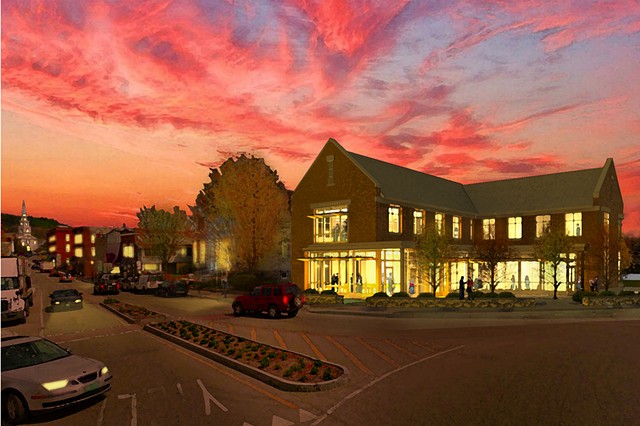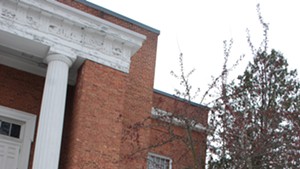
- Courtesy of Town of Middlebury
- An architectural rendering of the proposed town offices.
A week out from Town Meeting Day, opponents of a hotly debated proposed building project in Middlebury are accusing the town of peddling false information to town voters. Pointing to a flyer sent out at the cost of nearly $3,000, the opponents believe the town is trying to convince voters to OK a $6.5 million bond to build a new town office and recreation center — but say the town isn’t being upfront with its residents.
“I am disappointed that my taxpayer dollars have been spent on what comes off as a flagrant attempt to mislead the voter,” said selectboard member Craig Bingham, addressing his fellow members of the seven-member board on Tuesday evening. “How can the voters trust the information that has been given to them when the town produces and mails a document to each voter that contains deceptive information and glaring falsehoods?”
But what opponents of the project call “glaring falsehoods,” other town officials describe as a good-faith effort to educate voters about the upcoming ballot item.
“Nowhere on [the flyer] does it say how to vote,” said Nancy Malcolm, who chairs the steering committee for the town office project. “It just is straight information.”
Bingham’s allegations are the latest in a series of increasingly heated back-and-forths that have played out in the op-ed pages of Middlebury’s newspaper, the
Addison County Independent, and on the streets of the village. Lawn signs and bumper stickers began cropping up months ago urging fellow residents, “Don’t sell the heart of Middlebury.”
The proposal coming before voters is
a complicated one, with lots of moving pieces. If approved, the town and Middlebury College would essentially swap two pieces of downtown real estate. The town would hand over the location of its current town offices — a triangle-shaped wedge of land between College and Main streets — in exchange for property a stone’s throw away, at 77 Main Street.
The plan calls for demolishing the current offices — a 1911 building originally constructed as a town high school, severely damaged in a 1954 fire — and building new offices at the 77 Main Street location. The college, in turn, would build a park where the current town offices stand. The town would take out a bond for $6.5 million for the entire project, but the college is promising to pay $4.5 million of that debt. The college is also planning to chip in an addition $1 million for relocation and demolition costs.
As part of the plan, the current recreation facilities at the town offices — headquartered in the town gym — would be relocated from the downtown village to a spot near the Middlebury Union middle and high schools. On Tuesday night, voters in the the local unified school district voted 306 to 118 in favor of negotiating a lease with the town for the new rec facility.
That college money will likely be off the table if the town decides instead to either renovate or build new town offices at the existing site. The college has a history of chipping in generously for town projects — a few years back, the school signed on to funding $9 million out of the $16 million to construct a new bridge in town. But in this case, the college's generosity appears motivated at least partly by its wish to add the current town offices site to the campus; the triangular plot would open up what the student newspaper the Middlebury Campus calls a "sweeping vista" of the college that is currently obstructed by the town office complex.
If voters approve the plan, which has the backing of the selectboard, the town estimates that construction could begin in September, with the project scheduled to be finished in August 2015.
Proponents of the plan say it’s a deal too good to pass up. Information put out by the town says that, according to a 2012 study,
renovating or building from scratch at the existing site would cost between $8.9 and $9.6 million — which represents far too great a tax burden for the town, says
Addison County Independent editor and publisher Angelo Lynn.
“We have the luxury of another option, and we’re thumbing our nose at it, and it could cost us for the next 20 years,” he said. “That to me is not smart.”
In his
most recent editorial in favor of the ballot item, Lynn writes that a “very vocal minority” has cropped up again and again to block the project. “They don’t want the college to have more land, regardless of the price offered,” he writes, after outlining five reasons why he believes the town should vote in favor of the proposal. “It is an emotional argument that works on a gut level, but when looked at rationally, does not make common sense.”
The newspaper has been so deluged with letters about the project, the editors have instituted a new policy, limiting readers to one letter per topic in the run-up to Town Meeting Day.
On the other side of the issue, opponents have trotted out numerous objections. The college “land grab” is one of them. Others complain that the process has been rushed and opaque, without adequate input from town residents along the way. Several leveled conflict-of-interest objections at members of the selectboard with ties to the college, including a professor emeritus (who has since resigned from the board) and a member who has a spouse employed by the college.
They’ve also taken issue with the financial picture painted by the project’s supporters, saying that the town should investigate cheaper options for renovating the existing structure. The town-gown plan “isn’t a good deal,” says Ron Kohn, a 10-year resident of Middlebury, saying the town should consider cheaper, piecemeal renovations to the town offices and municipal gym. (The architects charged with advancing the town office complex project
say that is a myth.)
“Start over,” Kohn said, standing in the hallway of the town offices after Tuesday night’s meeting on a chipped linoleum floor. “Get real. There’s no hurry. Look at it — this building is not falling down.”
Starting over is exactly what Bingham wants.
“I think a sale of any town property should not be taken lightly, and the prominence of this location is beyond compare,” he said on Tuesday night.
Bingham’s fear, though, is that the flyer sent out to town voters oversimplifies the project.
“Dean, I’m here for something that is not part of the agenda,” Bingham chimed up during Tuesday evening’s meeting, when chair Dean George opened the floor for public comment.
In a prepared statement, Bingham took issue with several perceived inaccuracies in the mailing. While the current building might be poorly insulated, he said, it’s certainly not “uninsulated,” as the flyer claimed. Curious about the mention of “numerous code violations, including the lack of fire-rated egress stairs,” Bingham reached out to the regional director of the division of fire safety — who told him that there aren’t any fire code violations on the books for the town offices.
In addition to pinpointing the alleged errors, he took issue with “taxpayer money being spent on what amounts to puffery about the proposed project.” Some of the language used in the flyer sounded like “a shady used car salesman [trying] to close a deal.”
Bingham’s remarks were met by a smattering of applause from a half-dozen or so members of the public. When George opened up the floor for further public comment, others echoed Bingham’s complaints; Victoria DeWind called the flyer overly simplistic, and “more propaganda than information.”
George characterized the town’s dealings with the college, and its approach to planning for the proposed town offices as “above board.” He believes the flyer accurately sketches out the choice before voters. Now, he said, it’s time for the town to weigh in.












Comments (2)
Showing 1-2 of 2
Comments are closed.
From 2014-2020, Seven Days allowed readers to comment on all stories posted on our website. While we've appreciated the suggestions and insights, right now Seven Days is prioritizing our core mission — producing high-quality, responsible local journalism — over moderating online debates between readers.
To criticize, correct or praise our reporting, please send us a letter to the editor or send us a tip. We’ll check it out and report the results.
Online comments may return when we have better tech tools for managing them. Thanks for reading.